If you’ve ever wondered what foods can make a significant impact on your health and longevity, the answer lies in superfoods. These nutrient-dense, powerhouse ingredients have been the subject of extensive nutrition research, and they are celebrated not only for their rich content of vitamins and minerals but also for their powerful antioxidant properties and other unique health benefits. Whether you’re looking to improve your gut health, support brain function, or even manage your sugar intake, superfoods offer a natural, effective way to achieve your health goals. Let’s dive deep into the science behind these exceptional foods and uncover how they can transform your life.
What Are Superfoods?
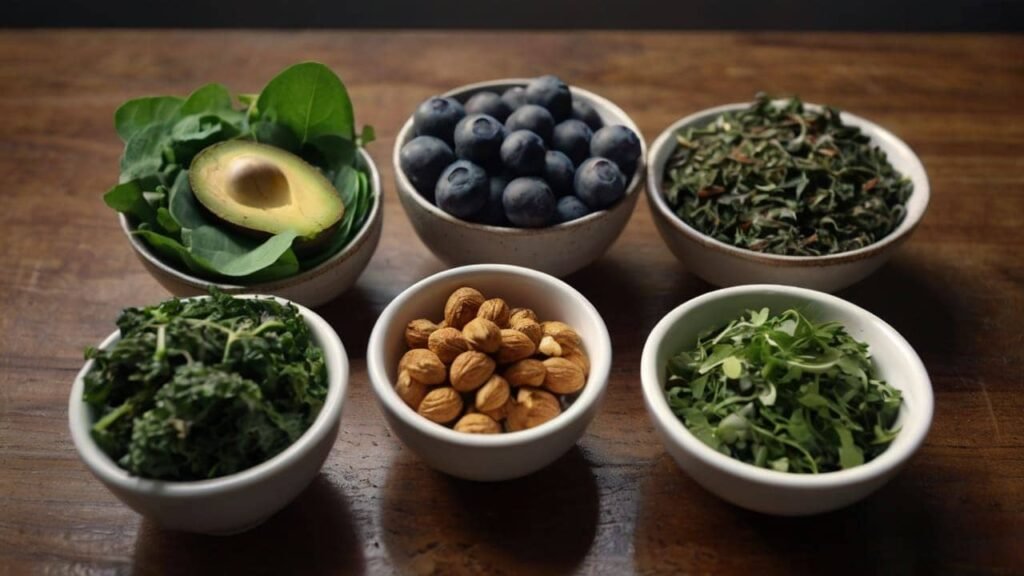
Defining Superfoods: More Than Just a Buzzword
Superfoods are not a myth or a marketing gimmick. According to the Harvard T.H. Chan School of Public Health, superfoods are nutrient-rich foods considered to be especially beneficial for health and well-being. While there’s no strict scientific definition, superfoods are generally understood to be foods high in antioxidants, vitamins, minerals, and other essential nutrients that can help protect against disease, promote overall health, and support longevity. The term “superfoods” encompasses a wide range of foods, including fruits, vegetables, nuts, seeds, and even certain types of fish and dairy.
Why Superfoods Matter: The Science Behind Their Impact
What sets superfoods apart from regular foods is their concentration of antioxidants and nutrients that play a crucial role in preventing chronic diseases. For example, studies have shown that antioxidant foods can reduce oxidative stress, which is linked to aging and various health issues such as heart disease, cancer, and cognitive decline. The high levels of vitamins, minerals, and healthy fats found in superfoods also contribute to better gut health, improved brain function, and even more efficient weight management.
The Role of Functional Foods in Longevity
Functional foods, a category that includes many superfoods, are foods that provide additional health benefits beyond basic nutrition. According to research published in Nutrition Journal, these foods contain biologically active compounds that can positively impact human health. Incorporating these foods into your diet can support various bodily functions, from enhancing immunity to boosting brain health and promoting longevity.
1. Blueberries: The Antioxidant Powerhouse
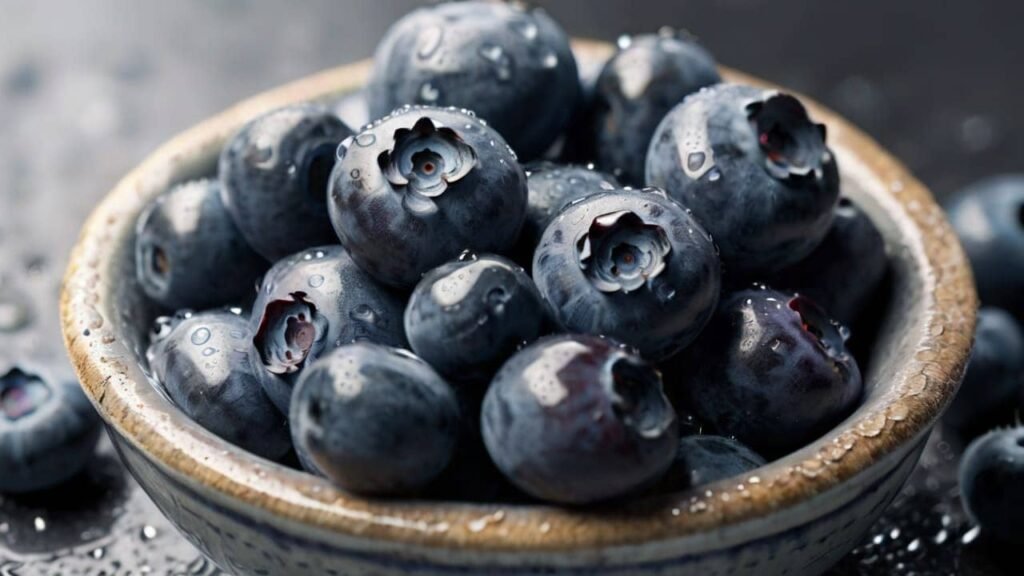
Why Blueberries Top the List of Superfoods
When it comes to antioxidant foods, blueberries are the stars. These small, vibrant berries are packed with anthocyanins, which give them their blue hue and provide powerful antioxidant properties. A study from the Journal of Agricultural and Food Chemistry found that blueberries have one of the highest antioxidant levels among all fruits and vegetables.
Health Benefits of Blueberries
- Brain Health: Blueberries are often referred to as “brain health foods” because they can help delay brain aging and improve memory. The flavonoids in blueberries have been shown to interact with aging neurons, enhancing cognitive function.
- Heart Health: Regular consumption of blueberries has been linked to a reduced risk of heart disease. A 2019 study in The American Journal of Clinical Nutrition demonstrated that eating a cup of blueberries daily for six months improved arterial function and reduced blood pressure.
- Gut Health: Rich in fiber, blueberries promote healthy digestion and support beneficial gut bacteria, playing a crucial role in maintaining a healthy gut microbiome.
How to Add More Blueberries to Your Diet
You can easily incorporate blueberries into your meals. Add them to your morning oatmeal, blend them into smoothies, or enjoy them as a fresh snack. For a more savory twist, consider adding blueberries to salads or using them as a topping for grilled meats.
2. Kale: The King of Greens
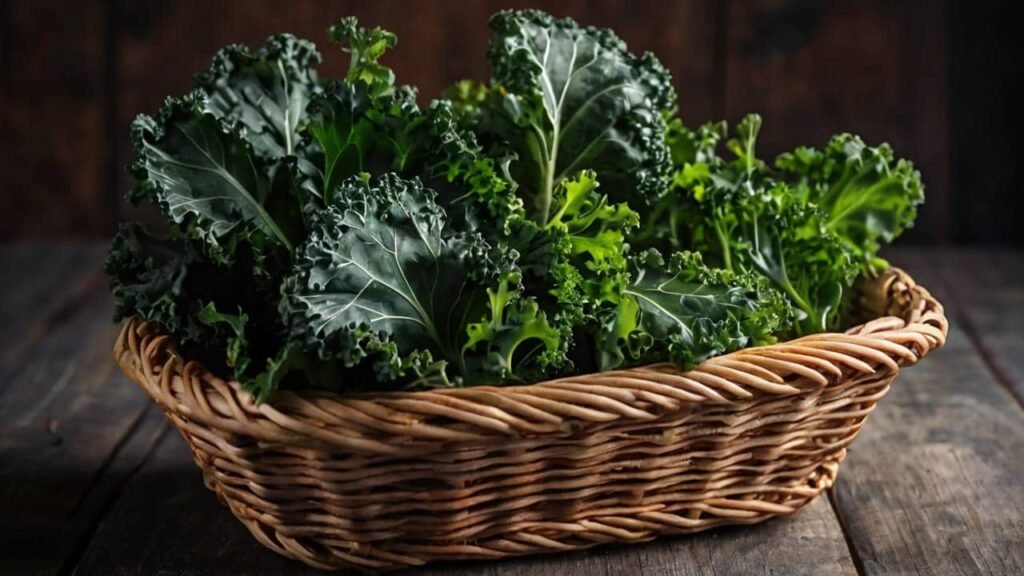
Kale’s Rise to Fame: What Makes It a Superfood?
Kale, often dubbed the “king of greens,” has earned its place in the superfoods hall of fame thanks to its high nutrient density. A single cup of kale provides more than 100% of the recommended daily intake of vitamins A, C, and K, along with significant amounts of calcium, potassium, and magnesium.
The Science-Backed Benefits of Kale
- Cancer Prevention: Kale is rich in glucosinolates, sulfur-containing compounds that have been shown to inhibit the growth of certain cancers, according to The Journal of Clinical Nutrition.
- Bone Health: With high levels of vitamin K and calcium, kale supports bone health and helps prevent osteoporosis.
- Eye Health: Lutein and zeaxanthin, two carotenoids found in kale, are known to reduce the risk of age-related macular degeneration and cataracts.
Easy Ways to Eat More Kale
Kale can be a bit tough when raw, but massaging it with olive oil or lemon juice can soften the leaves. Add it to salads, soups, or smoothies, or bake it into crispy kale chips for a healthy snack.
3. Salmon: The Omega-3 Rich Protein

Why Salmon is a Must-Have in Your Diet
Salmon is a fantastic source of high-quality protein and omega-3 fatty acids, which are essential for heart health and brain function. Research from the British Journal of Nutrition highlights that regular consumption of fatty fish like salmon is associated with lower rates of heart disease and improved cognitive function.
Key Health Benefits of Salmon
- Heart Health: Omega-3 fatty acids help reduce inflammation and lower blood pressure, significantly lowering the risk of heart disease.
- Brain Function: These healthy fats are also crucial for maintaining brain health, reducing the risk of cognitive decline and supporting mental well-being.
- Weight Management: High in protein and healthy fats, salmon promotes satiety, making it easier to manage weight and avoid overeating.
Incorporating Salmon into Your Meals
Salmon can be grilled, baked, or pan-seared for a quick, delicious meal. For a heart-healthy dish, pair it with a side of antioxidant-rich vegetables like spinach or kale.
4. Chia Seeds: The Tiny Giants of Nutrition
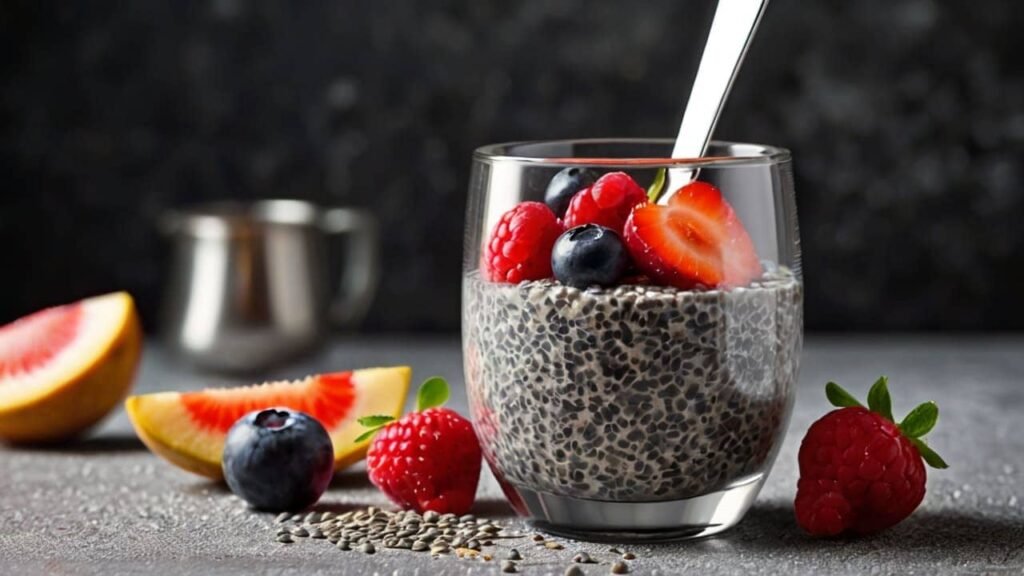
What Makes Chia Seeds a Superfood?
Don’t be fooled by their size; chia seeds are tiny nutritional powerhouses. Packed with fiber, protein, omega-3 fatty acids, and a range of micronutrients, these little seeds have been consumed for their health benefits since ancient times. Modern science backs up these benefits, with studies from The Journal of Food Science noting their antioxidant capacity and potential to improve cardiovascular health.
Health Benefits of Chia Seeds
- Weight Management: High in fiber, chia seeds help you feel full longer, reducing overall calorie intake and supporting weight loss efforts.
- Digestive Health: The soluble fiber in chia seeds aids in digestion and helps regulate bowel movements, promoting a healthy gut.
- Blood Sugar Control: Chia seeds can help stabilize blood sugar levels, making them an excellent addition for those looking to manage their sugar impact.
How to Enjoy Chia Seeds Daily
Chia seeds are incredibly versatile. Add them to smoothies, sprinkle them on yogurt or oatmeal, or create a chia seed pudding by soaking them in almond milk overnight.
5. Turmeric: The Golden Spice of Life

The Nutritional Value of Turmeric
Turmeric is more than just a spice; it’s a potent medicinal herb. The active compound in turmeric, curcumin, is known for its strong anti-inflammatory and antioxidant properties. Studies published in Advances in Experimental Medicine and Biology have shown that curcumin can help combat chronic inflammation, which is linked to various diseases.
Benefits of Turmeric for Health
- Anti-Inflammatory Effects: Curcumin is as effective as some anti-inflammatory drugs but without side effects.
- Joint Health: Curcumin supplements have been found to alleviate symptoms of arthritis and joint pain.
- Brain Health: Turmeric may boost brain health by increasing levels of brain-derived neurotrophic factor (BDNF), which is linked to improved cognitive function and reduced risk of neurodegenerative diseases.
How to Incorporate Turmeric in Your Diet
Turmeric can be added to curries, soups, and even smoothies. For better absorption, pair it with black pepper, which enhances curcumin absorption by up to 2,000%.
6. Green Tea: The Elixir of Longevity

Why Green Tea is a Superfood
Green tea is loaded with antioxidants, particularly catechins, which are known to prevent cell damage. The Journal of Food Science and Technology notes that regular consumption of green tea is associated with a reduced risk of various cancers, heart disease, and neurodegenerative disorders.
Health Benefits of Green Tea
- Heart Health: Green tea has been shown to lower LDL cholesterol and triglycerides, reducing the risk of heart disease.
- Brain Function: The caffeine and L-theanine in green tea improve brain function, making it a popular choice for boosting mental alertness.
- Weight Management: Studies suggest that green tea can enhance fat burning and improve metabolic rate, making it a helpful tool for weight management.
Tips for Drinking Green Tea
For maximum health benefits, drink freshly brewed green tea rather than bottled versions, which may contain added sugars. Add a squeeze of lemon to enhance flavor and antioxidant absorption.
7. Walnuts: The Nutty Nutrient Powerhouse
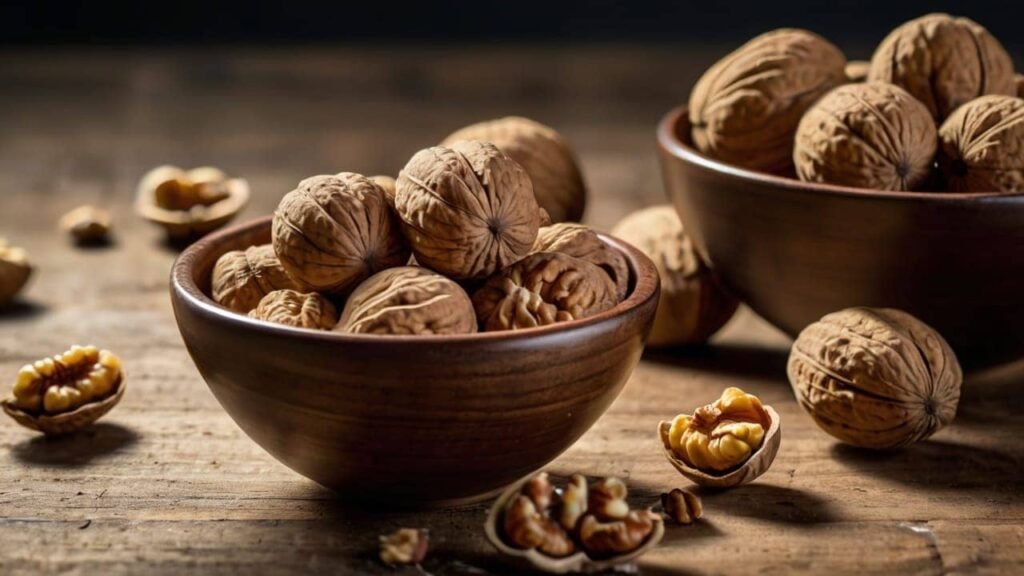
Why Walnuts Deserve a Place in Your Diet
Walnuts are a rich source of healthy fats, protein, and essential nutrients like magnesium and vitamin E. They are particularly high in polyunsaturated fats, including omega-3 fatty acids, which are crucial for heart and brain health.
Key Benefits of Walnuts
- Heart Health: Walnuts have been shown to lower LDL cholesterol and improve endothelial function, which is critical for heart health.
- Brain Function: Rich in DHA, a type of omega-3 fatty acid, walnuts are considered excellent brain health foods, supporting cognitive function and reducing the risk of neurodegenerative diseases.
- Antioxidant Properties: Walnuts are among the top antioxidant foods, helping to fight oxidative stress and inflammation.
How to Enjoy Walnuts in Your Meals
Walnuts can be added to salads, oatmeal, or yogurt, or enjoyed as a snack on their own. For a flavorful twist, try spiced walnuts or mix them into baked goods.
8. Avocado: The Creamy Superfruit

What Makes Avocado a Superfood?
Avocado is a unique fruit, known for its creamy texture and high healthy fat content. It is rich in monounsaturated fats, vitamins E, C, K, and B-6, as well as folate, magnesium, and potassium. The Journal of Nutrition highlights its potential to support heart health, weight management, and more.
Health Benefits of Avocado
- Heart Health: The monounsaturated fats in avocados can lower bad cholesterol levels, reducing the risk of heart disease.
- Eye Health: Avocados contain lutein and zeaxanthin, antioxidants that are essential for eye health.
- Weight Management: Despite being high in calories, avocados are filling and can help control appetite, supporting weight loss.
Creative Ways to Add Avocado to Your Diet
Avocado can be added to smoothies, spread on toast, sliced into salads, or used as a topping for soups. It’s also the perfect base for guacamole.
9. Spinach: The Leafy Green Superfood

Why Spinach is a Nutritional Superstar
Spinach is a leafy green packed with vitamins A, C, K, magnesium, iron, and folate. It is a low-calorie, high-nutrient food that supports multiple aspects of health.
Benefits of Spinach for Health
- Eye Health: Like kale and avocados, spinach is rich in lutein and zeaxanthin, making it an excellent food for maintaining healthy vision.
- Blood Pressure Control: The high levels of nitrates in spinach help dilate blood vessels, reducing blood pressure.
- Bone Health: Spinach is a great source of vitamin K, which is essential for bone health and reducing the risk of fractures.
Delicious Ways to Eat Spinach
Spinach can be used in salads, soups, or smoothies. It’s also a great addition to omelets, sandwiches, and pasta dishes.
10. Dark Chocolate: The Sweet Superfood

Why Dark Chocolate is Good for You
Yes, you read that right—dark chocolate is indeed a superfood! Rich in antioxidants, particularly flavonoids, dark chocolate has been shown to improve heart health and brain function. The Journal of the American Heart Association has noted that moderate consumption of dark chocolate can reduce the risk of heart disease.
Health Benefits of Dark Chocolate
- Heart Health: The flavonoids in dark chocolate help lower blood pressure and improve blood flow, reducing the risk of heart disease.
- Brain Function: Dark chocolate can enhance cognitive function and mood, thanks to its ability to boost serotonin levels.
- Weight Management: Surprisingly, dark chocolate may help with weight management by reducing cravings for sweet, salty, and fatty foods.
Tips for Choosing the Right Dark Chocolate
Opt for dark chocolate with at least 70% cocoa content to maximize health benefits. Enjoy it in moderation to satisfy your sweet tooth while supporting your health.
Fuel Your Health with Superfoods: The Journey to Longevity
The journey to longevity is paved with small, mindful choices, and incorporating superfoods into your daily diet is one of the most impactful steps you can take. From antioxidant-rich blueberries to the heart-healthy properties of salmon, these 10 superfoods offer a wide range of benefits that support overall well-being and long, vibrant life.
For more science-backed tips on nutrition and health, explore our other articles and dive deeper into the fascinating world of food science and longevity.


